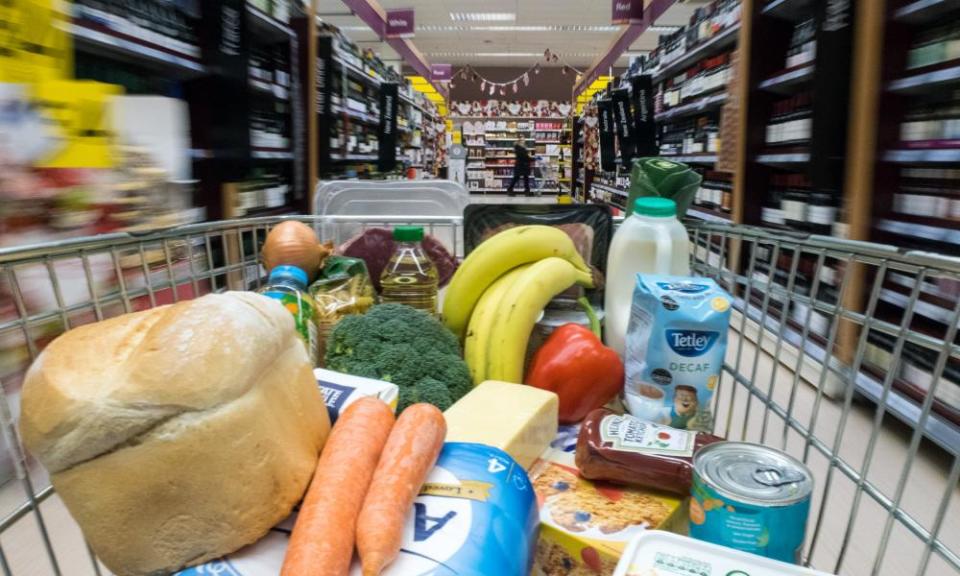UK households under pressure as inflation sticks at 3%

British households remained under significant pressure last month from rising prices as the rate of inflation stayed at its highest level for almost six years, continuing the squeeze on consumers.
The consumer price index (CPI) held steady at 3% in January for the second month running, according to the Office for National Statistics, confounding economists’ expectations that the rate would fall to 2.9% as the effects of the post-EU referendum drop in the pound begin to fade.
The reading comes after the Bank of England stoked speculation about a rise in interest rates from as early as May by suggesting last week that it would need to increase the cost of borrowing somewhat earlier and to a greater extent than previously expected. The figures show CPI sticking stubbornly above the Bank’s target rate of 2% set by the government.
Inflation is when prices rise. Deflation is the opposite – price decreases over time – but inflation is far more common.
If inflation is 10%, then a £50 pair of shoes will cost £55 in a year's time and £60.50 a year after that.
Inflation eats away at the value of wages and savings – if you earn 10% on your savings but inflation is 10%, the real rate of interest on your pot is actually 0%.
A relatively new phenomenon, inflation has become a real worry for governments since the 1960s.
As a rule of thumb, times of high inflation are good for borrowers and bad for investors.
Mortgages are a good example of how borrowing can be advantageous – annual inflation of 10% over seven years halves the real value of a mortgage.
On the other hand, pensioners, who depend on a fixed income, watch the value of their assets erode.
The government's preferred measure of inflation, and the one the Bank of England takes into account when setting interest rates, is the consumer price index (CPI).
The retail prices index (RPI) is often used in wage negotiations.
The ONS said the cost of buying tickets for attractions such as zoos and gardens, as well as the price of music downloads and books, had fallen considerably less rapidly than would have been expected at the start of the year.
The increasing cost of recreation and culture was partially offset by falling prices for food and non-alcoholic drinks such as tea and coffee, with a particularly sharp fall in the price of meat recorded last month. There was also downward pressure on inflation from a slower rise in the cost of fuel from a year ago.
Statisticians said that after rising strongly since around the time of the Brexit vote in the middle of 2016, when the weak pound pushed up the cost of imports to Britain, food price inflation now appeared to be slowing. Economists believe the rate of inflation will gradually fall over the coming months as a consequence.
However, Nikesh Sawjani, an economist at Lloyds Bank, said the unchanged CPI reading from December showed the downward trend in inflation was likely to be very gradual. “Over the coming months, as the fading impact of previous sterling weakness unwinds, domestic inflation pressures are expected to build,” he said.
The Bank of England has warned that the fading effects from the fall in sterling will be offset by rising oil prices. Although it has begun to fall again in recent weeks, the price of crude has risen by more than 20% over the past six months amid booming global demand from an upswing in economic activity in the eurozone, US and China.
Economists are also looking for evidence of increasing wage growth from official figures due to be released next week, which could put further upward pressure on the cost of living as companies increase their prices to accommodate higher wage bills. Mark Carney, the Bank’s governor, has said inflation could rise above 3% over the coming months from a combination of the residual effects of the weak pound and the rising oil price and accelerating global growth that is lifting demand for goods and services.
Wage growth has so far proven sluggish, and some economists do not believe workers will see their pay rise above the rate of inflation this year.
Peter Dowd, Labour’s shadow chief secretary to the Treasury, said: “With inflation remaining around a five-year high, working people are still seeing their incomes squeezed as wages fail to keep up with prices, and household debt levels soar.”
The pound rose against the dollar on international exchanges as investors bet on the increasing likelihood of an earlier rate rise from Threadneedle Street, with sterling hitting $1.39 against the US currency.
Financial markets have been thrown into turmoil in recent weeks over growing fears of stubbornly high inflation. Investors are concerned that central banks may need to raise interest rates more quickly than previously thought in order to prevent prices from spiralling out of control.
Joel Kruger of currency trading firm LMAX Exchange said: “A prolonged period of subdued inflation around the globe has been a major contributor to record high stock markets … the reversal of this process should therefore have the opposite effect.”

 Yahoo Finance
Yahoo Finance 